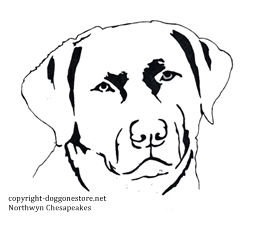The activities listed below will help your new puppy become incorporated
into the household.
This process is called socialization.
Your new pet will become strongly attached to your family during
his period between 7-12 weeks of age.
This bond will last a lifetime.
It is important that your puppy learn he/she is the subordinate
member of the family.
This will minimize the potential for bad habits and behavior
problems such as dominance or aggression. It is vital that everyone in
the family practice these exercises.
Younger children should have adult supervision.
The following activities should become part of the normal routine
for your dog.
While
the puppy is small, pick it up frequently.
Look into the dog’s eyes until it looks away.
Rub the puppies stomach while it is on it’s back.
During grooming or petting, use moderate pressure from the head
to tail.
During play don’t allow puppy to stand on or over you.
I recommend never
playing tug-of-war games.
Encourage fetch and retrieve.
Teach the dog to sit.
Use short but frequent sessions for young dogs.
Practice taking food away at mealtime, then giving it back again.
Praise compliance.
Displace dog from sleeping area.
Praise dog for compliance. Teach pup to relinquish toys or
objects on command. (Give, leave it, etc.) Praise dog for good behavior
even when resting quietly.
Practice manipulating the ears, paws, tail, and mouth.
Never use a command unless you’re sure the dog will obey or you
can make it obey.
Have your pet obey commands prior to everyday activities.
Incorporate obedience commands. (Sit before feeding, heeling
before playing, sit before going outdoors.)
Use effective punishments. - Grab scruff of neck, shake and say
“no”.
Along with the “no”, put them in a sit or down position for a
short period of time.
This way they have to stop what they are going, sit and behave.
Never let a puppy/dog growl.
If it is a larger dog, slightly lift up on the leash, straight
above the choke collar, hold for a moment, advise dog “no-sit”,
release pressure.
It dogs continues to growl or jump around, choke up again for a
moment, do the no-sit, and release pressure.
When dogs responds by stopping the misbehavior and sitting
quietly, then immediately say “good-dog” and pet him while he
continues sitting for a few moments. Show him that is what you want him to do.
Be firm not rough.
Accustom your puppy to many things at a young age: Baths (see grooming
article), brushing, clipping nails, cleaning ears, having teeth
examined, and so on. Taking the time to make these things matter of fact
and pleasant for your puppy.
Brushing is important, especially for double coated dogs when
they begin to shed. A little effort now to get your puppy to enjoy
brushing will save you a lot of trouble later when it begins to shed and
you need to brush him.
During
your puppy's first year, it is very important that he be exposed to a
variety of social situations. After the puppy has had all its shots,
carefully expose it to the outside world. Take it to different places:
parks, shopping centers, schools, different neighborhoods, dog shows,
obedience classes--just about anywhere you can think of that would be
different for a little puppy. If the puppy seems afraid, then let it
explore by itself. Encourage the puppy, but be firm, not coaxing. If you
want to take the pup in an elevator, let it try it on its own, but
firmly insist that it have the experience.
Your favorite dog food and supply store (unless it's a pet store)
is a good place; dog shows are another. Soccer and Little League games
are good.
Make them sit every time when someone comes up to them and sit to
get petted.
You want the pup to learn about the world so that it doesn't
react fearfully to new situations when it is an adult. You also want it
to learn that you will not ask it to do anything dangerous or harmful.
Socializing your dog can be much fun for you and the dog!
Do
not commit the classic mistake made by many owners when their dogs
exhibit fear or aggression on meeting strangers. DO NOT
"soothe" them, or say things like "easy, boy/girl,"
"it's OK..." This serves as reinforcement and encourages the
fear or growling! Instead, say "no!" sharply and praise him
when he stops. Praise him even more when he allows his head to be
petted. If it starts growling or backing up again, say "no!"
Be a little more gentle with the "no" if the dog exhibits
fear, but be firm. With a growling dog, be much more emphatic and stern
with your "no!" If you are planning to attend a puppy class
(and you should, they are not expensive) ask the instructor about
her/his views before you sign up. If you are not happy with the things
they intend to teach, look elsewhere. Contact your breeder for an
information about obedience clubs nearby.

